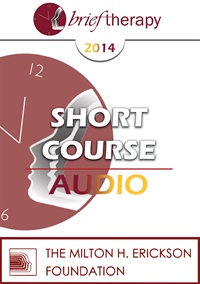
- Average Rating:
- Not yet rated
- Topic Areas:
- Anxiety | Depression | Trauma | Short Courses | Rational Emotive Behavior Therapy (REBT) | Pain and Healing | Brief Therapy
- Categories:
- Brief Therapy Conference | Brief Therapy Conference 2014
- Faculty:
- Debbie Joffe Ellis
- Duration:
- 1:31:16
- Format:
- Audio Only
- Original Program Date:
- Dec 11, 2014
- Short Description:
- Rational Emotive Behavior Therapy (REBT), the holistic approach considered to be the grandparent of cognitive approaches, created by the renowned and brilliant pioneer Albert Ellis PhD, is most effective as a brief therapy for lessening, transforming, healing and preventing emotional disturbances. This Short Course includes a live clinical demonstration, and present the main aspects, methods and techniques of this vigorous, bold and compassionate approach, and is presented by Debbie Joffe Ellis, wife of Albert Ellis.
- Price:
- $15.00 - Base Price
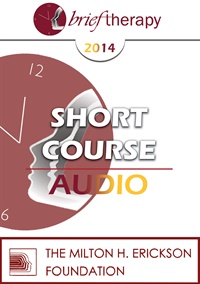
- Average Rating:
- Not yet rated
- Topic Areas:
- Short Courses | Hypnosis | Hypnotherapy | Self-Hypnosis | Ericksonian Hypnosis and Therapy Techniques | Anxiety | Depression | Post-Traumatic Stress Disorder (PTSD)
- Categories:
- Brief Therapy Conference | Brief Therapy Conference 2014
- Faculty:
- Paul Koeck, MD
- Duration:
- 1:37:58
- Format:
- Audio Only
- Original Program Date:
- Dec 11, 2014
- Short Description:
- Hypnotic Scaling is a simple Ericksonian & Solution Focused (self)hypnotic technique, developed by Paul Koeck, MD to help your client self-control and resolve Anxiety and Depression or symptoms of PTSD. You will be able to teach your client to freely choose where (s)he wants to be at a scale from 0 to 10 at any moment or in any context using (Self) Hypnotic Scaling. Your client will be able to choose his emotions, thoughts or feelings when and where (s)he wants!
- Price:
- $15.00 - Base Price
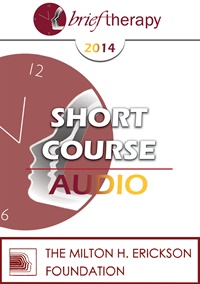
- Average Rating:
- Not yet rated
- Topic Areas:
- Anxiety | Depression | Trauma | Short Courses | Brief Therapy
- Categories:
- Brief Therapy Conference | Brief Therapy Conference 2014
- Faculty:
- Teresa Robles, MA, PhD
- Duration:
- 1:30:29
- Format:
- Audio Only
- Original Program Date:
- Dec 11, 2014
- Short Description:
- After a presentation of original, new conceptualizations on Anxiety, Depression, Trauma and Universal Wisdom, presenter will do an exercise to participants for contacting their Universal Wisdom and to learn how to utilize It. She will demonstrate and participants will practice and discuss exercises and how to teach them to clients.
- Price:
- $15.00 - Base Price
Tags: Anxiety Brief Therapy Depression Trauma
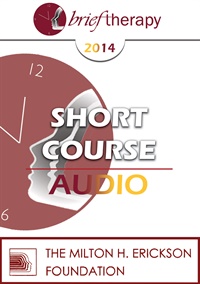
- Average Rating:
- Not yet rated
- Topic Areas:
- Anxiety | Depression | Trauma | Short Courses | Milton Erickson | Brief Therapy
- Categories:
- Brief Therapy Conference | Brief Therapy Conference 2014
- Faculty:
- Dale Bertram, PhD | Mike Rankin, MA
- Duration:
- 1:33:32
- Format:
- Audio Only
- Original Program Date:
- Dec 11, 2014
- Short Description:
- This workshop focuses on the nuts and bolts of providing online Ericksonian Clinical Supervision. It will address how to select an online platform, the major legal and ethical issues in providing online supervision, and a focused discussion on how to utilize the online environment to provide quality supervision. Participants will leave this workshop with a good overview about how to conduct digital (online) supervision in ethical and useful ways.
- Price:
- $15.00 - Base Price
Tags: Anxiety Depression Trauma Brief Therapy
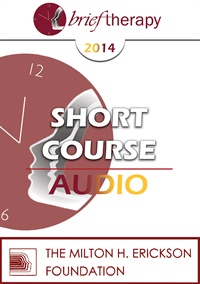
- Average Rating:
- Not yet rated
- Topic Areas:
- Anxiety | Depression | Trauma | Short Courses | Brief Therapy | Ericksonian Hypnosis and Therapy Techniques | Consciousness
- Categories:
- Brief Therapy Conference | Brief Therapy Conference 2014
- Faculty:
- Joseph Dowling, MS, LPC
- Duration:
- 1:27:36
- Format:
- Audio Only
- Original Program Date:
- Dec 11, 2014
- Short Description:
- Milton H. Erickson, M.D. understood that the conscious (thinking) mind is where symptoms are frequently created and cultivated while the subconscious mind is a limitless storehouse of healing energies, potentials, and solutions. This short course will describe a deceptively simple, Ericksonian approach to becoming powerfully calm. Live demonstrations, experiential zone exercises, and case studies will be facilitated to teach how solution-focused questions, strategic interventions, and formal/conversational hypnotherapy effectively treat anxiety, depression, and trauma.
- Price:
- $15.00 - Base Price
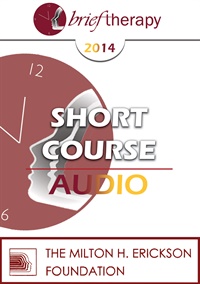
- Average Rating:
- Not yet rated
- Topic Areas:
- Anxiety | Depression | Trauma | Short Courses | Ericksonian Hypnosis and Therapy Techniques | Reality Therapy | Brief Therapy
- Categories:
- Brief Therapy Conference | Brief Therapy Conference 2014
- Faculty:
- Robert Wubbolding, EdD
- Duration:
- 1:29:28
- Format:
- Audio Only
- Original Program Date:
- Dec 11, 2014
- Short Description:
- A demonstration and a 12-minute DVD illustrate how to assist clients to make effective choices satisfying their needs, especially power or inner control. Merging reality therapy with Ericksonian principles helps clients discover and choose alternatives to the manifestations of past trauma, the pain of powerlessness due to anxiety and depression.
- Price:
- $15.00 - Base Price
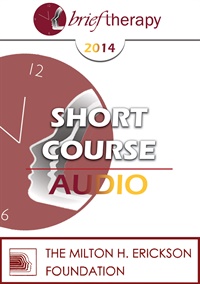
- Average Rating:
- Not yet rated
- Topic Areas:
- Anxiety | Depression | Trauma | Short Courses | Brief Therapy
- Categories:
- Brief Therapy Conference | Brief Therapy Conference 2014
- Faculty:
- Virgil Hayes, DO
- Duration:
- 1:33:07
- Format:
- Audio Only
- Original Program Date:
- Dec 11, 2014
- Short Description:
- There are multiple explanations and theories to explain the creation of anxiety, depression and trauma creation. Many emphasize pathology, permanence of conditions and use multi-syllable words and encourage medical interventions to treat symptoms. This paradigm is often not effective for improving the lives of individuals treated. This course looks at non-medical underpinnings to conceptualize the creation of anxiety, depression and trauma.
- Price:
- $15.00 - Base Price
Tags: Anxiety Depression Trauma Brief Therapy
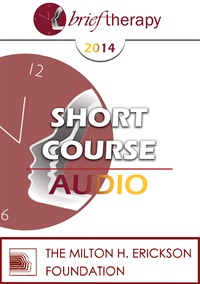
- Average Rating:
- Not yet rated
- Topic Areas:
- Anxiety | Depression | Short Courses | Communication | Neurobiology | Brief Therapy | Trauma
- Categories:
- Brief Therapy Conference | Brief Therapy Conference 2014
- Faculty:
- Bart Walsh, MSW
- Duration:
- 1:31:46
- Format:
- Audio Only
- Original Program Date:
- Dec 11, 2014
- Short Description:
- There are multiple explanations and theories to explain the creation of anxiety, depression and trauma creation. Many emphasize pathology, permanence of conditions and use multi-syllable words and encourage medical interventions to treat symptoms. This paradigm is often not effective for improving the lives of individuals treated. This course looks at non-medical underpinnings to conceptualize the creation of anxiety, depression and trauma. This conceptualization when understood by the clinician; makes them a better facilitator and co-creator in the treatment process. A natural, holistic understanding also empowers the clinician and client and moves all parties involved closer to health.
- Price:
- $15.00 - Base Price
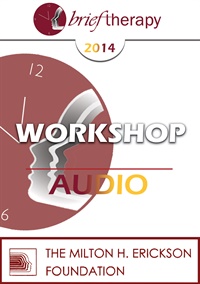
- Average Rating:
- Not yet rated
- Topic Areas:
- Anxiety | Depression | Workshops | Brief Therapy
- Categories:
- Brief Therapy Conference | Brief Therapy Conference 2014
- Faculty:
- Michael Yapko, PhD
- Duration:
- 1:58:22
- Format:
- Audio Only
- Original Program Date:
- Dec 12, 2014
- Short Description:
- Rumination involves spinning around the same thoughts over and over again, analyzing endlessly why something happened or what to do about some situation. Rumination increases anxiety and depression levels, and perpetuates itself by the client believing that by ruminating, he or she is “doing something.” In this workshop, we’ll explore rumination and its negative effects, highlight the relationship between rumination and global cognition, and emphasize the importance of developing good discrimination skills. We’ll also consider the role of experiential processes such as hypnosis and mindfulness in treatment didactically as well as with a guided group experience.
- Price:
- $15.00 - Base Price
Tags: Anxiety Brief Therapy Depression
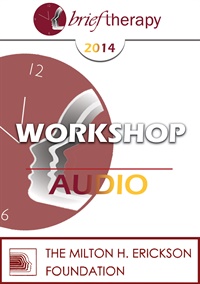
- Average Rating:
- Not yet rated
- Topic Areas:
- Anxiety | Depression | Trauma | Cognitive Behavior Therapy (CBT) | Hypnosis | Workshops | Ericksonian Hypnosis and Therapy Techniques | Milton Erickson | Brief Therapy | Naturalistic
- Categories:
- Brief Therapy Conference | Brief Therapy Conference 2014
- Faculty:
- Ernest Rossi, PhD | Kathryn Rossi, PhD | Roxanna Erickson Klein, RN, PhD, LPC, LCDC
- Duration:
- 1:59:16
- Format:
- Audio Only
- Original Program Date:
- Dec 12, 2014
- Short Description:
- Ernest Rossi, PhD, Roxanna Erickson-Klein and Kathryn Rossi review the case work of Milton H. Erickson, MD in counseling, psychotherapy, therapeutic hypnosis and rehabilitation as evidence-based cognitive behavior therapy to treat anxiety, depression and trauma. This experiential workshop explores the timeless nature of the work of Milton H. Erickson, who substantially influenced the manner that psychotherapy is practiced in the 21 century.
- Price:
- $15.00 - Base Price
Please wait ...

